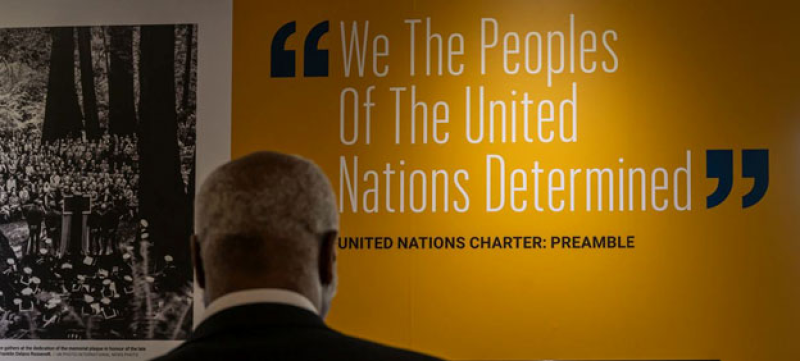- Israeli Aggression against Qatar, Extension of Crimes against Palestine |
- No place is safe in Gaza. No one is safe |
- Stocks fail to recover despite slight gains in Dhaka, Ctg |
- BB Purchases $353m in Dollar Auction to Stabilise Taka |
- Promoting social inclusion of disabled persons thru empowerment |
US Visa Ban Raises Concerns Ahead of UN 80th Anniversary

The preambular words of the UN Charter displayed at the United Nations Headquarters, in New York.
When the 193-member General Assembly commemorates the UN’s 80th anniversary during a high-level meeting in mid-September, questions arise over how many political leaders and delegates may be barred from entering the United States—despite the 1947 US–UN Host Country Agreement.
In June, US President Donald Trump issued a proclamation titled Restricting the Entry of Foreign Nationals to Protect the United States From Foreign Terrorists and Other National Security and Public Safety Threats. The order functions as a virtual blacklist, restricting travel from 19 countries whose nationals will be denied US visas.
The list includes Afghanistan, Myanmar, Burundi, Chad, Republic of the Congo, Cuba, Equatorial Guinea, Eritrea, Haiti, Iran, Laos, Libya, Sierra Leone, Somalia, Sudan, Togo, Turkmenistan, Venezuela, and Yemen. Egypt is under review. But will this policy also result in barring political leaders and UN delegates?
Any denial of visas would violate Sections 11–14 of the Host Country Agreement, which ensures that representatives of member states, UN officials, and others with legitimate business can access UN headquarters without impediments. The agreement also obliges the US to facilitate visas for UN-related travel. Together with the Convention on the Privileges and Immunities of the United Nations, it forms the legal framework for the UN’s operations in the US.
So far, the US has imposed sanctions on UN Special Rapporteur Francesca Albanese for her critical report on Israel. UN Spokesperson Stéphane Dujarric called this a “dangerous precedent,” stressing that unilateral sanctions against Special Rapporteurs or UN experts are “unacceptable.” UN rights chief Volker Turk urged Washington to reverse the sanctions, saying threats against Albanese and other mandate-holders “must stop.”
Meanwhile, the US has also sanctioned officials of the Palestinian Authority and members of the Palestine Liberation Organization (PLO), accusing them of undermining peace efforts with Israel—even as other Western powers moved toward recognising Palestinian statehood.
Experts remain sceptical about whether the US will respect its host country obligations. Dr Alon Ben-Meir of NYU argued that Trump thrives on defying systems and laws to remain the centre of attention. He warned the administration could create problems for the General Assembly and block UN resolutions critical of Israel or recognising Palestine.
Others noted that diplomatic visas should, in principle, exempt UN delegates from the travel ban. “Unless there is extraordinary interference from Trump, the travel ban should not impact diplomats travelling to the UN,” said Ben-Meir.
Civil society groups also cautioned the US against undermining the UN’s work. “The United States derives immense economic and political benefits from hosting UN headquarters. It would be highly unwise to restrict foreign representatives,” said Mandeep S. Tiwana, Secretary General of CIVICUS.
Norman Solomon of the Institute for Public Accuracy added that barring diplomats “violates not only the basic principles of the UN but also reflects extreme arrogance,” while pointing to the US’s consistent attempts to bend the UN to its will.
The US has a history of imposing restrictions on “unfriendly” nations’ diplomats. In 2013, it denied a visa to Sudanese President Omar al-Bashir, indicted by the International Criminal Court. In 1988, Washington barred PLO leader Yasser Arafat from entering; the General Assembly responded by relocating its meeting to Geneva in protest.

